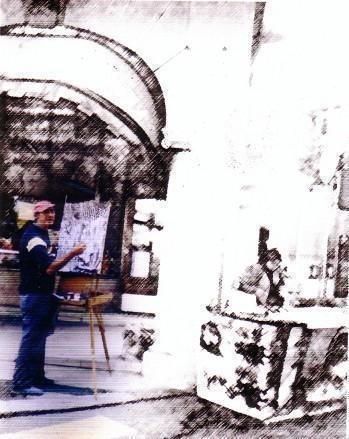The relationship with the work was never idyllic, Boscolo. Indeed, we say that it was quite intolerant towards him. Especially refractory to permanent position and the routine that inevitably entailed. Still works and places it changed so many. This indifference, however, boasted of never having been unemployed a day. And it was true. Years were lucky, there was no crisis of any occupational category, and most of the work was still done manually. Rarely required education qualification, still prevailed strength and athleticism. His secret was that. As a young corpulent and also good-looking, employers did not hesitate to hire him. These are his words.
But another of his peculiarities was this: when he knocked one of those doors, claimed to be capable and experienced in performing the task request. And he endeavored invented, wearing clothes that had never worn. The nice thing is that most of the time he could play well and kept the place. Other times it was lost in a short time. Once told (laughing), its shorter work experience. When he was hired at a construction site and, having claimed to be a bricklayer with several years of experience, the foreman put it to work immediately with cement and trowel to plaster a wall. He picked up the tool load of mortar, waiting to be pushed forward against the wall, he tried, but the dough took the opposite direction and ended up plastering the face of the superior. He was immediately fired. To understand his versatility in the field, just think of a winter evening when he and his son and a son's friend, did the work on behalf of the specialties that had experimented. The result was about seventy varieties. We can only imagine the number of jobs, jobs that often left so not too orthodox. Episodes, these, due to a rather irascible personality and indomitable, even more pronounced, at the time, the youth and the little wisdom that this brings.
Intolerance to the above-mentioned work increased exponentially after trips to Italy and the consequent devotion to the art. Took some time to paint and on time if you took it. Affected by Graves' disease and one of its more subtle forms, considered inoperable by doctors, received partial disability, which allowed him to long periods of illness alternating with short periods of work. Thus being able to devote to his art most of the time. Finally broke free from the slavery of work a few years later, when he became an invalid one hundred percent.
So it was that the art prevailed.
WOODNS
The last master of the road
The work
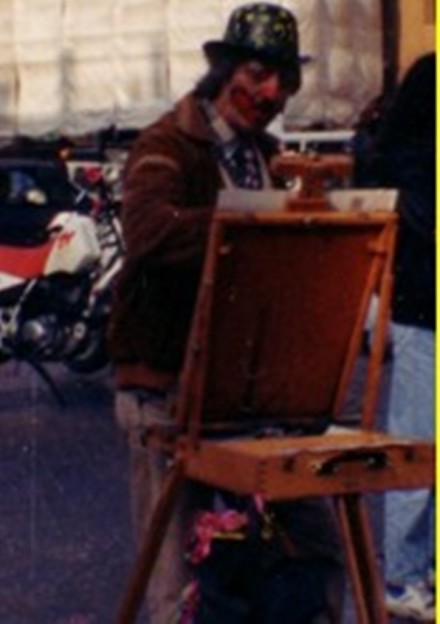
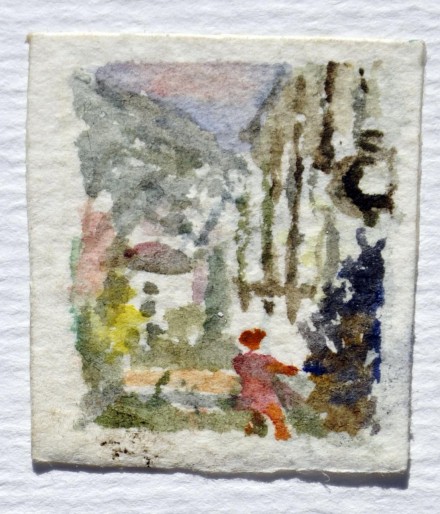
Miniature watercolor on cotton paper 2,5 x3 cm
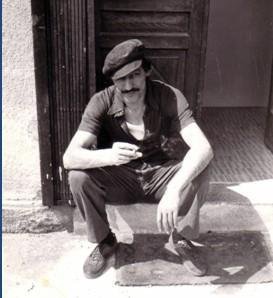
In those years, the world of work ... still prevailed strength and athleticism.
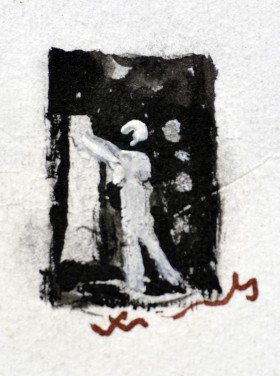
Dark series - Work. Miniature, mixed charcoal and acrylic on cotton paper, 2,5 x3, 5 cm (Private Collection - F. & M. B. W.
Terracina, 10-17 agosto 2019 , "Oltre..."

Event not to be missed! Nadia Turella and Giovanna Sacchetti, two contemporary artists whose works are inspired by various themes imbued with present are on display. Arguments and questions, of a moral and current nature that although they do not want, concern us and touch us closely in this time and in our journey. Nadia, guides us and leads us with the significant and beautiful works, through antithetical worlds. Lands in which elements like, friendship and bullying, the right to childhood and violence against women and children, the discriminating color of the skin and the beauty of the colors of mother nature and its respect are contrasted. Giovanna with her enchanting works accompanies us and guides us in her enchanted world, made up of trees and figures, defined by her as "angelic" that speak of emotions, loneliness, anger and protest against all forms of violence. His figurative missive urges us to understand that we are all one and we must live in harmony with everything, respecting other beings. So the message of both enclosed in the title of the exhibition is "Beyond" as a wish ... Because there is always hope that everything will improve. F.B.W.

Welcome, this website has joined the project Zero Impact Web Although he has already done much to reduce CO2 emissions, also pollutes the internet. According to a Greenpeace report, with the growth rate of today, in 2020, data centers and telecommunication networks will consume about 2,000 billion kilowatt-hours of electricity, more than triple their current consumption. That is why the website www.woodns.it decided to join Zero Impact Web and do its part to combat global warming. Emissions from your visits will be compensated through the creation and protection of forest growth. It is a small action that, if done by many helps to create awareness and do good for the environment. And best of all allows you to navigate between these pages with confidence! You should also adhere to this initiative, together we can make a difference! Emissions from this website are compensated for by the creation and protection of forests in Costa Rica
